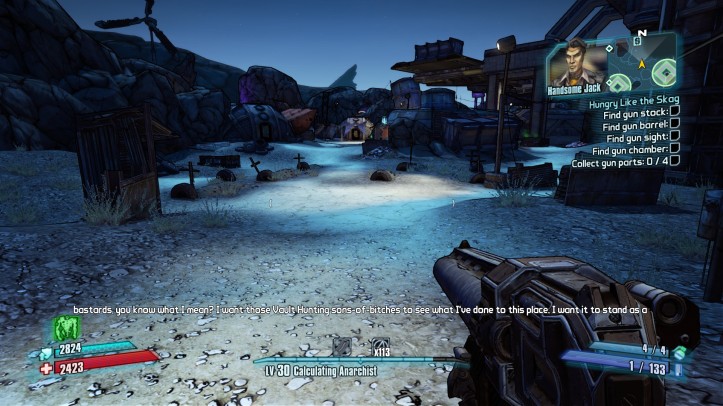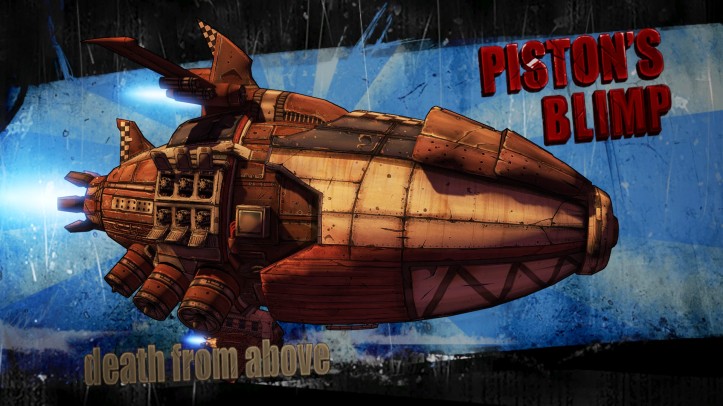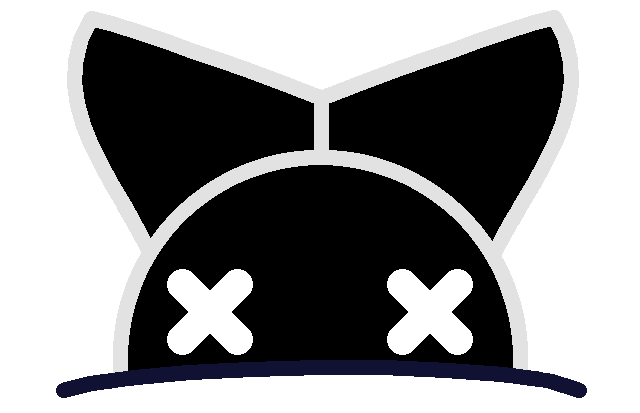This is just a minor thing, but it kinda caught my eye. If you’ve played Borderlands, you’ll know that it’s like a drop-in-drop-out game. The missions are all the same, you’re just either doing them alone or in a party. But the developers don’t want to have to re-record all the lines depending on whether you’re alone or in a group, so what do they do? Well, they fudge it.
Alongside the difference between one person and lots of people, the developers were also dealing with the fact that you can play both male and female characters. That’s another potential problem: gender as well as number. Mostly the player-character is referred to in the second person, allowing the developers to avoid the issue to some extent. So for instance in the game’s opening cutscene, you’ve got Jack’s monologue, where he’s addressing the player directly:
“Don’t get me wrong, it’s cute that you all think you’re the heroes of this little adventure, but — you’re not. You’re bandits. You’re the bad guys.”
The basic ‘you’ is both singular and plural, which is handy. It means the line pulls double-duty. It’s also non-gendered, so it’s really the gold standard in easy writing. Even the little ‘you all’ works for everyone. For a party, it’s clearly referring to the party as a whole. For a single player, it reads like Jack is talking about the player as part of the wider community of Vault Hunters. It’s like if you were talking to a Mexican, and you said ‘You all have really good food over there,’ referring to Mexico. You’re talking to the individual as an individual, but in terms of their relationship to a wider group.

So that’s the really simple option. That’s where the writing is just easy and direct, and you don’t have to worry about the gender implications. But that’s not the only type of dialogue. There’s also references to the player in the third person – that’s he, she, and they. For instance, when the player arrives in Sanctuary, Jack broadcasts a message:
“Bandits of Sanctuary. I hear a new Vault Hunter has arrived in your city. So just turn ’em in to me, and you’ll be rewarded.”
Now ‘them’ is a pretty good option too, as far as pronouns go. It can be used both in the singular and as a plural, and for both men and women – so it has most of the ambiguity of ‘you’. It can fill all the required roles without much fuss. But here, it’s actually used in an explicitly singular way. Jack refers specifically to ‘a new Vault Hunter’ – just one. He’s therefore also using ‘them’ as a singular pronoun. Basically the point here is that not all the lines make sense for all the possible player configurations. If you’ve got multiple players in a session, that line doesn’t fully make sense. Not a huge issue, just worth noting.
So in their little arsenal of pronouns, the writers have ‘you’ and ‘they’, which are generally pretty versatile. But they also spend a bunch of time indiscriminately applying gendered terms to players. For instance, Scooter uses terms like ‘bro’ and ‘man’:
“Whoa, unauthorized user all up in my grill! You trying to hack mah Catch-A-Ride? Uncool, bro, uncool.”
“Oh, hey man — Ellie and I was just talkin’ bout ya. Now you… you make sure to come back alive, okay?”
Because the lines are only recorded once, these terms are applied to both male and female characters. Scooter goes around calling women ‘bro’ and ‘man’ – which in some ways feels quite natural for his character. Similarly, Tiny Tina refers to players as ‘girl’:
“Damn, girl. You got skillz to pay the billz.”
And that line plays for both male and female characters. It’s all a little bit gender-bendy, huh. You could argue that it’s like the Jack example above – that is, you could argue that Tina and Scooter are using lines that just don’t apply in all situations. But I suspect that the intention is to just bend the limits of gender a little bit. It’s not even necessarily that radical. It’s not uncommon for gay men to refer to each other as ‘girl’ or ‘queen’, and even that language isn’t restricted to the gay community. I know guys who will greet their male friends with ‘hey babe’.

In short, what’s going on here is that Borderlands 2 takes this potential difficulty with the lines and turns it into an opportunity. The dialogue generally relies heavily on ‘you’ and ‘them’, but it also sprinkles in these little gendered terms now and again. If you’re playing a female character and hear a female term like ‘girl’, it might seem unremarkable. But there’s also this little subversive moment where you’re playing a male character and hear the same line – you can imagine Tina going ‘Damn, girl’ to Salvador or something. It just pushes a little bit at our understanding of gender, in a really light and non-confrontational way.
There’s a related (but obviously not identical) thing going on with how the game treats sexuality. You’ll randomly discover that characters are gay in a really offhanded kind of manner. There aren’t really any characters that you’d point at and go ‘That one’s gay’ – the game doesn’t use heavy coding, in that sense. There’s no flamboyant gay friend. Instead, it’ll just come up in conversation – almost accidentally. There’s a bit in the Animal Wildlife Preserve where Jack is ordering a (female) scientist to inject test subjects with chemicals, and he says something like “If you ever want to see your wife again, you’ll do what I say.” And it’s not given any particular emphasis – it’s not held up like ‘hey, it’s a gay person! let’s make their character revolve around their sexuality!’ It’s just a really offhanded casual reference. I’ve often been surprised by characters’ sexuality – which partly is revealing my own heteronormative attitudes, but it’s also a testament to the Borderlands writing team. You can’t spot the lesbians from a hundred miles away, because they’re presented as normal people just like everybody else. There aren’t any of the stereotypical markers of gay identity. Anyway – it’s a relatively lightweight point, but turns out the Borderlands team are pretty progressive on gender and sexuality. They’re conscious about the issues, and it comes across in their work. Good job team.


[…] And that’s obviously not the sort of conversation that I’m trying to have. I’ve said before that Borderlands is remarkably good on questions of gender and sexuality. They have a surprisingly […]
LikeLike